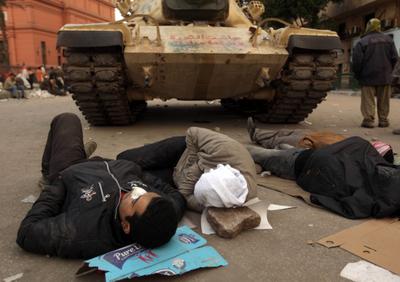The most tragic case by far is likely to be Libya, with the civil conflict looking likely to continue for some time. There remains the possibility of a Western-imposed ‘no-fly-zone,’ or of foreign arms, training or other support for the anti-Gaddafi forces, any of which might expedite Gaddafi’s demise. Otherwise, a quick military win for either side looks less and less likely.
This is critical because Libya offers the potential to be another Somalia, Sudan, or something similar. Gaddafi has shown a willingness to be brutal and repressive, even by the fierce standards of the region. Libya is a very tribalised society, with some tribes armed by the Gaddafi regime and others marginalised by it. If Gaddafi’s militia forces, foreign mercenaries, and a divided military are added to this mix, it becomes a potent mix. Libya’s neighbours over recent times have given the world the tragedy in Darfur and the brutal civil war in Algeria; a collapse of Libya and civil war might still be added to that wicked list.
The prospects for Egypt are considerably better, although not from the common Western angle of democratic reform. Many observers have failed to understand that the removal of Hosni Mubarak in Egypt was not ultimately the result of the popular uprisings, but rather, Mubarak was removed by the Egyptian army. Mubarak threatened the stability of Egypt and thus the army’s financial and political advantage within the system. The protests, once they had momentum, convinced the army to sacrifice Mubarak.
What this means is that, when analysts look back on Egypt in 20 or 30 years’ time, they may view the events of January-February as leadership change, but not something that led to profound systemic change. The army did not remove Mubarak simply to then hand power to others; their coup was about an overall maintenance of the system. There may be some economic and social reforms in Egypt in the current transitional phase or under a new president, and some political reform is almost certain — but the army will maintain its dominant and privileged position in the system, too.
Elsewhere in the region, many leaders are on notice. The protests in Bahrain shook the al-Khalifa family. It is a recent rule of Arab politics that monarchies have in recent decades been more popular and legitimate than revolutionary leaders — although only after many monarchies were removed back in the 1950s and 1960s by revolutionary figures or military coups. The Bahraini royals have come closest to disproving this rule: they may yet face renewed protests, and even though they have promised to talk to the protestors and to address at least some of their grievances, their long-term survival is by no means guaranteed.
Other leaders are on notice elsewhere. In Yemen, Ali Abdullah Saleh still faces real threats, and may yet be ousted — his promise not to seek yet another term as president in 2013 has helped his prospects, but only a little. The presidents of Algeria and Syria, the Kings of Morocco, Jordan, Kuwait, and Saudi Arabia, and the clerics in Tehran all are much more nervous now that a popular uprising could truly unseat them. Many are buying off their people with populist economic measures or handouts; all are trying to buy time or enough popular toleration to ensure they retain power.
As this occurs, the economic bargains in the region may be restructured more in favour of the local populations. The protests arose in part from popular anger at the missed opportunities of economic reform, the unfair distribution of wealth under reform programs, and the corruption and other ill-effects of liberalisation. Leaders may throw the baby out with the bathwater and simply give up on economic liberalisation, or they might genuinely address corruption, unemployment, and the worst of the failings of economic reforms in recent decades. The paradox is that reforms will most help those who were prominent in the protests, but weaker or inept reform simply increases the risk of more protests again one day soon.
Most leaders probably will now also have to make some political changes — but they will only make some. It remains unlikely that a genuine democratisation will occur — the vested interests and elite bargains of too many states preclude it — but it is likely that some political reforms will be implemented still, to give people a greater input into policy or a louder voice with their leaders. Democracy and political liberalism are not absolutes: the most likely outcome is a shift towards them, but only a modest shift.
These remain the most likely outlooks. Tempting as it is to claim that these protests are epoch-changing, and impressive as they are, they have only removed two leaders thus far. Even if they take a couple more, and bring some other changes, there is a durability to the political and economic orders of the Middle East that makes any change far less spectacular than the protests might lead us to expect.
Matthew Gray is a Senior Lecturer at the Centre for Arab & Islamic Studies at the Australian National University.

